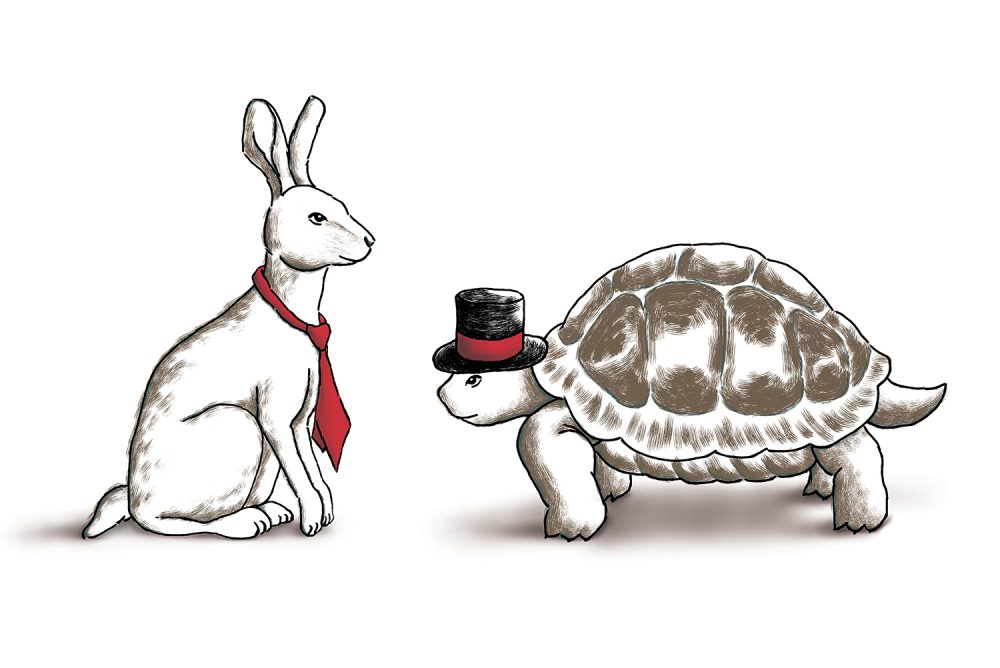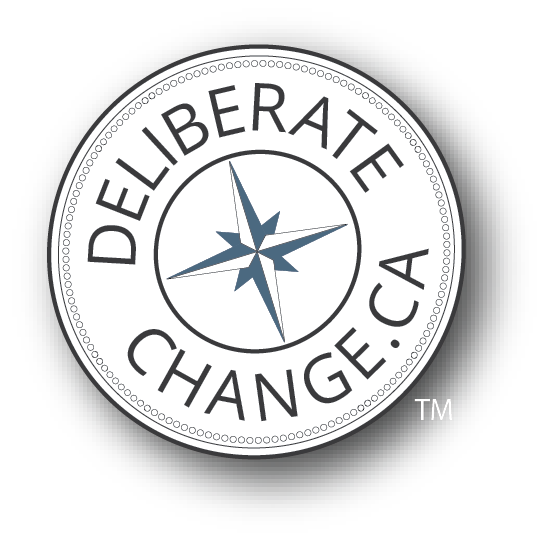
Digital Artwork Credit: Andrea Urbaniak – www.urbaniak.ca
Well, the truth is, I’m not actually recommending that.
You see, “don’t give 100%” does not mean don’t give your best effort. The punchline here before you click away and label me a slacker and fraud, is that I’m advocating for balance and sustainability in your work. Like the famous children’s fable. If you give everything you’ve got all the time, you will burn out and become useless. Or perhaps grow complacent and eventually not care at all. And then who will be the slacker and the fraud?
So let’s back up to the starting line and unpack these wild thoughts and crazy accusations…
What Does “100%” Really Mean?
We’ve all heard the metaphor of “giving 110%” or some other random number higher than that. Technically that’s impossible because by definition 100% is the limit. And you can’t go beyond the limit, because that’s what a limit is. Everybody to the limit…
OK, maybe, but when we say 100%, that means 100% of what? Your total daily dose of 24 hours? Allotted time in the office? Mental energy or physical strength? Your spouse’s acceptance criteria associated with your physical or emotional absence?
Quite frankly, I don’t really care about all of the different “100%” definitions and metaphors and clichés out there. For the purpose of today’s post, I will simply define 100% as giving everything you’ve got for some period of time.
Of course, that level and time are highly correlated. Think of different types of running. The sprinter will run faster and for a much shorter time than the marathon runner, but top athletes in both sports are giving everything they’ve got. That is what I mean when I say 100%. It is your personal limit for whatever set of tasks lie ahead in the short to medium term.
Why Should You Not Give 100% All the Time?
Overall, on average, you should obviously be providing your employer and your customers with greater returns than they need or expect. That is how you will earn, keep, and expand your business. This is true whether it’s your company’s business or your “personal business” of selling your time in exchange for hopefully increasing salary.
Perhaps that’s exactly my definition of 100%. But to constantly operate at 100% would mean a far longer time horizon than even the marathon analogy. It would be like running a marathon every day, forever. Even a top athlete will need to pause at some point.
In other words, figure out your limit and dial it back a little bit most of the time. If you dial it back and slow down at least somewhat as a general rule of thumb, you will be more likely to have the reserve energy to crank it up to ludicrous speed when it’s truly necessary. (And no, that’s not actually a Tesla reference…)
Peaks and Troughs
In life, there will be periods of frenzy and periods of less-than-peak efficiency. You can therefore think of your energy, time, engagement and enthusiasm as a series of waves with their respective peaks and troughs. Your peak expenditures of mental, physical and emotional energy are balanced out by the troughs where you recoup. Of course, if you spend too much time at the peak of the wave, you will crash before you reach the next trough. And if you spend too much time in a trough you will become bored, lazy and disgruntled.
These patterns can change over time. They can be anything from a set of several smaller waves on a calm evening lake to giant tsunamis of alternating periods of craziness and monotony. For example, I’m not a solider but I’ve worked with several. I’ve heard an interesting explanation of their battle experience: long periods of pure boredom punctuated by moments of absolute, sheer terror. How’s that for peaks and troughs?
Margin and Burnout
Last week I wrote about adding margin to your life. It’s definitely good to hustle and work your tail off for periods of time. But the key is periods of time. If the afterburner is constantly firing, you’re gonna run out of fuel sooner than later. Of course, that will lead to overall decreased productivity, decreased health (less sleep, less exercise, poor eating habits), and decreased happiness.

Photo credit: AvgeekJoe TOPSIDE OF THE CANADA 150 CF-18 IN BURNER via photopin (license)
Here’s a neat article that talks about how highly engaged employees are at risk of burnout (you might have to click past the landing page). They quantify burnout as a result of having high workloads and expectations without having the necessary support and recovery time. For example, “The higher the work demands, the higher employees’ need for support, acknowledgement, or opportunities for recovery.”
If you dial it back a bit and give yourself some room to breath on a regular basis (beyond just taking a short vacation every once in a while), then you will have more energy to pursue your passions. These could be exciting and challenging projects at work, or a side hustle, or volunteering, or a purely recreational hobby. These in turn will help you be more energic and engaged at work, and hopefully with a deceased risk of burnout.
Intangible Benefits
Don’t forget that there are also several intangible aspects of work that don’t get measured but absolutely contribute to your and your organization’s success. Think about the water cooler talk. Social events. Hallway tag-up meetings. Strategic planning, both solo and with others.
I have personally experienced very long periods where there was no time to breath. It was all I could do to get high-quality deliverables out the door on time and still catch a “solid” 5 hours of sleep. But unfortunately all of those intangible things also went out the door, metaphorically speaking. Not good.
By building some troughs into your overall work schedule, you build in time to talk with your customer and your coworkers about work stuff and non-work stuff. Taking the time to build those personal relationships will ensure a good flow of communication. If will help you to enjoy your day, provide a network to rely on, and give you the satisfaction of helping others. Use the troughs to let your mind wander and come up with new and innovative ideas to tackle the next big issue.
When is it OK to Give 100%?
(…or the proverbial 110%?)
Now, it wouldn’t be fair to talk about dialing it back if I also didn’t talk about when it’s appropriate to crank it up. If we go back to the wave analogy, you have to decide on the shape and duration of the peaks. And that will be different for every situation…
Long, Intense Waves
For example, Michael over at 25andFree chose about 7 years’ worth of peak, but he achieved full financial independence (FI) and retired at age 24. Kristy and Bryce at Millennial Revolution slogged through about 9 years of terrible employment to hit FI and retire around age 31.
Because I have a young family, I would personally rather spend more time with them now instead of grinding away for the next 5-8 years and missing my kids’ childhoods. So in my case, it’s very important to balance time and energy between work, family and volunteerism. But by keeping with my “balls in a jar” analogy from last week and recognizing that it’s OK to change up the balls, I don’t think I’m failing too badly with my balancing act.

Short, Intense Waves
Let’s say that the long-term continuous grind is not for you. You could instead prefer to tackle shorter-term intensive waves and dial it back more frequently between peaks. For example, if you’re pulling together an important bid or proposal at work, or preparing for a major professional certification exam, or launching a new business.
You could even argue that getting an engineering degree falls into this category. In my case I was in a co-op program that alternated 4 months of school with 4 months of work. After every short term academic burst was a few days’ rest and then a short term professional burst. So maybe that was a 5-year-long intense wave, but it felt like a series of shorter periods because work and school are so different.
Regardless of your personal situation, disposition or preference, keep an eye out for scope creep that turns into increased demands without a commensurate and eventual slow down. Sometimes you have to say no in order to keep your sanity and manage expectations. Serve your internal and external customers well, but don’t let anybody take advantage of you. Keep your workload sustainable. Ask for help. Ramp up your team. And keep an eye out for opportunities that will allow you to balance what you love to do with how much you need to do it!
 Your Turn Now!
Your Turn Now!
Do you prefer long-term or short-term bursts of full-out go-go-go? What will you do to better balance the need to deliver now with the need to avoid burnout so that you can continue to deliver later? How does your side-hustle connect with this notion?

 Your Turn Now!
Your Turn Now!







Your Turn Now! What's On Your Mind?